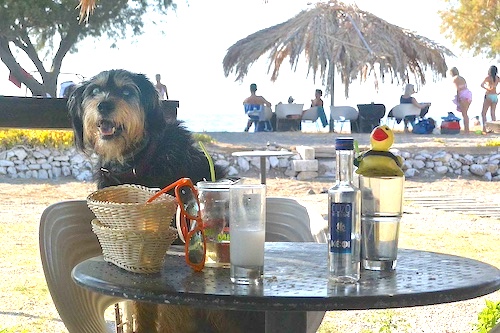The once precious quietness on the Greek islands has gone. Hundreds of thousands of tourists head for the Aegean and behave more and more like spoiled children. They have to be entertained and pampered on soft sun beds beside the sea or the pool (some tourists think the sea is just a dangerous pool of water). On Mykonos there is even a service that brushes the sand off your sunbed.
Regularly sunbeds come with the accompaniment of boom-boom-techno music, apparently giving more and more tourists the ultimate ‘holiday feeling’; they’d probably get nauseous listening to the rythmic sound of the waves. Nowadays tourists only are happy when they can roam the Greek village streets in thick masses, photograph the magical sunsets amidst thousands of people, or make selfies where ever TikTok is directing them, like with endangered seals at the small island of Formikoula. Hotels, afraid that their guests will get bored, have converted into amusement palaces and organize rowdy Greek and Disco evenings (causing residents to spend half their evenings with windows closed and earplugs in). That, of course, does not matter: the tourist now has been declared holy.
Greece is selling its soul to the devil. On more than one island the supply of water is not enough for this flood of tourists, resulting in a state of emergency. Farmers no longer have sufficient water for their crops: tourists first. Greece, still recovering from the financial crisis, uses tourists as a milk cow and has raised prices so much that lots of Greeks can no longer afford a holiday in their own country. They could take a job in tourism during their holidays, but you have to be desperate because wages are at starvation level. And even if they do go to the islands for work, they had better take a tent (just like doctors and teachers) to camp on the beach, because a reasonable place to stay can only be afforded by tourists.
A Greek journalist recently made an interesting point on (SKAI) TV: if Greece wants to earn more than 20 milliard euro, the Greeks themselves are not supposed to go anymore near the beaches from mid July through August. There will be no place anymore for the inhabitants of this country, only for tourists.
Just recently in Santorini, a member of the municipality advised its inhabitants to stay as much as possible inside their homes, thus freeing up the streets for the tourists: on one day alone, cruise ships can spew out more than 11,000 people. What a nice future: a country flattened by tourism. By the way: that these huge monster ships are still allowed to float on the seas is a disgrace.
Lesvos too is having more and more tourists and has made a deal with the devil. Here no floating holiday palaces, but an increasing number of ferries from Greece, but especially from Turkey (where raised prices in the travel and tourist sector forces masses of Turks to the Greek islands). There are weekends that ferries bring as many as 17,000 passengers from Izmir or Ayvalik to Mytilini. We should be questioning whether Lesvos can handle this exploding number of visitors (will they find a room or a table to eat at?) and will Lesvos be able to deal with water shortages, and parched vegetable gardens.
The municipality just lets it happen, just like it neglects its infrastructure, like the road to Eftalou that is nearly collapsing into the sea and where buses are no longer allowed. But the municipality did allow a revised entrance to Molyvos (a village on the list of Unesco World Heritage). There an atmospheric olive orchard and an open-air cinema had be be torn down to give way for a pool of tarmac: a parking lot where cars, for a fee, can bake in the hot summer sun. It is armed with intense lighting, also disturbing the twinkling night sky. This is a very sad story for the beauty of the village.
Last year, in different places in Greece, there was the ‘sunbed revolution’ against the illegal exploitation of the beaches that left no place for the locals. It was a small victory for the Greek people because this year you can download an app and complain if, for example, the sunbeds are within a distance of four meters from the sea or when a beach is not 70 % sunbed free. Hopefully it will not take long before the Greeks, like other nationalities (the Spaniards were first) will set up new battles, not only to get their beaches back, but also their cities and islands: and of course the much beloved Greek summer.











